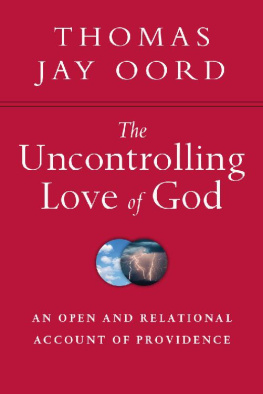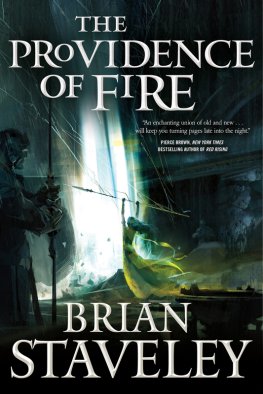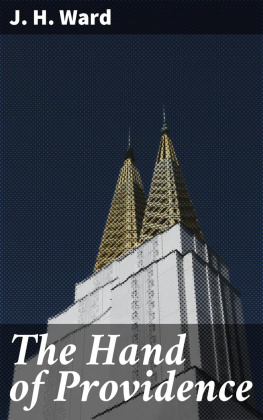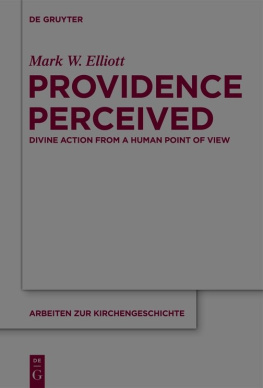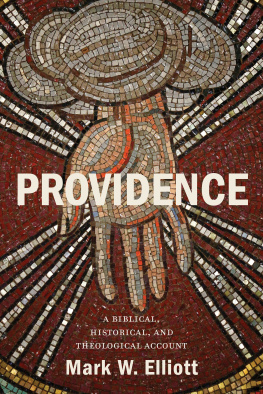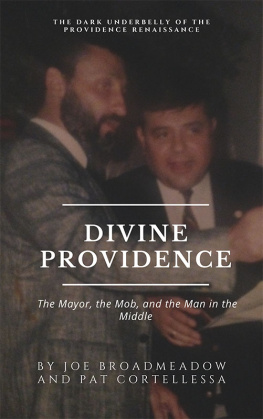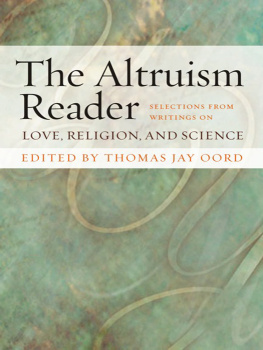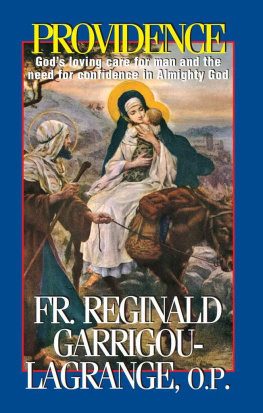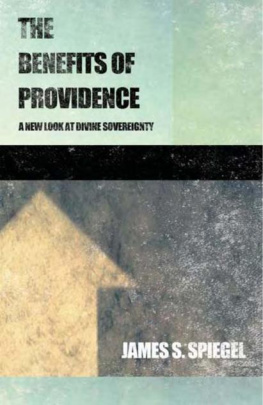Thomas Jay Oord - The Uncontrolling Love of God ; An Open and Relational Account of Providence
Here you can read online Thomas Jay Oord - The Uncontrolling Love of God ; An Open and Relational Account of Providence full text of the book (entire story) in english for free. Download pdf and epub, get meaning, cover and reviews about this ebook. year: 2015, publisher: InterVarsity Press, genre: Religion. Description of the work, (preface) as well as reviews are available. Best literature library LitArk.com created for fans of good reading and offers a wide selection of genres:
Romance novel
Science fiction
Adventure
Detective
Science
History
Home and family
Prose
Art
Politics
Computer
Non-fiction
Religion
Business
Children
Humor
Choose a favorite category and find really read worthwhile books. Enjoy immersion in the world of imagination, feel the emotions of the characters or learn something new for yourself, make an fascinating discovery.
- Book:The Uncontrolling Love of God ; An Open and Relational Account of Providence
- Author:
- Publisher:InterVarsity Press
- Genre:
- Year:2015
- Rating:3 / 5
- Favourites:Add to favourites
- Your mark:
- 60
- 1
- 2
- 3
- 4
- 5
The Uncontrolling Love of God ; An Open and Relational Account of Providence: summary, description and annotation
We offer to read an annotation, description, summary or preface (depends on what the author of the book "The Uncontrolling Love of God ; An Open and Relational Account of Providence" wrote himself). If you haven't found the necessary information about the book — write in the comments, we will try to find it.
Thomas Jay Oord: author's other books
Who wrote The Uncontrolling Love of God ; An Open and Relational Account of Providence? Find out the surname, the name of the author of the book and a list of all author's works by series.
The Uncontrolling Love of God ; An Open and Relational Account of Providence — read online for free the complete book (whole text) full work
Below is the text of the book, divided by pages. System saving the place of the last page read, allows you to conveniently read the book "The Uncontrolling Love of God ; An Open and Relational Account of Providence" online for free, without having to search again every time where you left off. Put a bookmark, and you can go to the page where you finished reading at any time.
Font size:
Interval:
Bookmark:
The
Uncontrolling
Love of God
AN OPEN AND RELATIONAL
ACCOUNT OF PROVIDENCE
THOMAS JAY OORD

For my daughter, Alexa:
a Christian, a scholar,
a leader
and so much more
Contents
Acknowledgments
A n eclectic set of ideas is present in this book. Many of these ideas emerged from conversations with good and wise people, some of whom I list below. Having written or edited more than twenty books, I know authors never succeed alone. It takes a proverbial village to make a book, even when one person does the writing.
In addition to the people I will mention, two experiences undoubtedly influenced me as I wrote this book. The first involved frequent hiking excursions into the wilderness and open country of Idaho, Oregon, Wyoming and California. A few weeklong treks, some weekend excursions, and numerous daylong or afternoon walks helped me decompress, meditate, focus and pray. Often I photographed the beauty of the natural world on these walks. Im grateful to my wife, daughters, friends and others who not only allowed me to take these walks but also encouraged me to take them.
The second exercise involved negotiating pain in my professorial life. I endured difficult days as I laid out the ideas in this book. Through that trying time, I felt strongly supported by university colleagues, scholars around the world, former students, pastors and leaders, friends from many arenas of life, and especially family. I am sure this trying experience shaped and deepened my views of providence, especially my view that God guides us on a lively adventure and calls us to live lives of love.
As a multidisciplinary scholar, I work with a wide range of research. I read widely and engage scholars from various fields. I also contribute to these conversations through publications of scholarship in theology, philosophy and science. Much of what I write portrays my creative synthesis of scholarship in various disciplines. Integrating this material and offering it in understandable language is an art and ministry I strive to practice. As the book progresses to the middle and final chapters, more of my original ideas emerge. In fact, I offer numerous original ideas in the book because I think we need creative originality to better understand Gods providence.
As I came to the end of my writing, I realized that this book fits nicely alongside two others I have written in the last five years. In Defining Love: A Philosophical, Scientific, and Theological Investigation, I addressed love from philosophical and scientific perspectives. As the title suggests, I offer a definition of love in light of various disciplines and visions of reality. Much of Defining Love explores loves forms and expressions in the social, biological and cosmological sciences. Only in the final chapter do I address theology and, briefly, essential kenosis.
In The Nature of Love: A Theology, my focus is mostly on theological issues pertaining to love, although biblical and philosophical themes emerge too. After talking about the need to place love at the center of formal theology and after defining love, I explore the biblically informed theology of Anders Nygren, the philosophically informed theology of Augustine, and the open theology of Clark Pinnock. In the final chapter, I make an argument for essential kenosis starting with Christology. I conclude by presenting essential kenosis in relation to other doctrinal issues.
Philosophy, science, Scripture and theology come together in the present book in a more balanced way. This allows me to address issues of providenceespecially evil and randomnessin a sustained manner. I also develop and explain essential kenosis more fully than I have previously. My overall goal is to make sense of randomness and evil in light of my conviction that a loving and powerful God exists and acts providentially.
As I said earlier, I am a firm believer that books emerge out of relationships, communities and networks. Although I cannot mention all who have influenced my writing, I do want to acknowledge some.
The book project was supported by a grant from the Randomness and Divine Providence project, directed by Jim Bradley and funded by the John Templeton Foundation. I especially thank Jim for believing in the importance of exploring the kinds of questions I address.
Several organizations, groups and societies have shaped my thinking, and I mention them alphabetically in appreciation: BioLogos Foundation, Christian Theological Research Fellowship, the University of Edinburgh (especially David Fergusson), the Faraday Institute for Science and Religion, the Ian Ramsey Centre for Science and Religion (especially the Special Divine Action conference), the International Society for Science and Religion, Nazarene Theological CollegeManchester, the Open and Relational Theologies group of the American Academy of Religion, the School of Theology and Christian Ministries at Northwest Nazarene University, the Wesleyan Philosophical Society, the Wesleyan Theological Society, WesleyNexus and Word Made Fresh.
I thank Burton Webb, Mark Maddix and Paula Kellerer for granting me a sabbatical at Northwest Nazarene University. During that time, I wrote a large portion of this book. Students in my graduate theological online-education classes at Northwest Nazarene University offered their evaluations; these students included Anita Albert-Watson, David Allen, Michelle Borbe, Sarah Brubaker, Amy Byerley, Barry Carney, Nicholas Carpenter, James Cendrowski, Joe Crosby, Sarah Dupray, Buford Edwards, Rodney Ellis, Thomas Evans, Cezarina Glendening, Jennifer Glover, Anthony Kayser, Angela Lerena, Aneel Mall, Rosanne McMath, Aaron Mednansky, Philip Michaels, Francis Mwansa, Jason Newman, Christopher Nikkel, Leslie Oden, Michael ONeill, Raquel Pereira, Donald Smith, Topher Taylor, Brad Thompson, Jonathan Thompson, Brian Troxell, Margaret Tyler, Tara West and Cassandra Wynn.
Many people read portions of the book and offered encouragement, correction or critique. Others influenced my thinking through conversation. I especially thank Craig Adams, Jay Akkerman, Dik Allan, Paul Allen, Denis Alexander, Ben Arbour, Ken Archer, J. J. Asson, Vaughn Baker, Wes Baldassare, Jeremy Bangs, Joseph Bankard, Ian Barbour, John Bechtold, Keith Besherse, Craig A. Boyd, Gregory Boyd, David Brown, Rachel Bryant, Anna Case-Winters, Charles Christian, Jeff Clarke, Philip Clayton, John Cobb, Ron Cole-Turner, Monica Coleman, Robin Collins, C. S. Cowles, John Culp, Scott Daniels, Celia Deane-Drummond, Hans Deventer, Brent Dirks, Chris Donato, Craig Drurey, Ben Duarte, Ray Dunning, Bo Eberle, George Ellis, Bruce Epperly, Michael Faber, Darrel Falk, David Fergusson, Terry Fretheim, Rob Fringer, Tripp Fuller, Karl Giberson, Jim Goetz, Joe Gorman, Nathan Greeley, David Griffin, Erik Groeneveld, Joe Groessl, Doug Hardy, Mark Harris, William Hasker, Jack Haught, Todd Holden, John Daniel Holloway, Curtis Holtzen, Nancy Howell, Jeremy Hugus, Jacob Hunt, Bob Hunter, Randy Isaac, Werner Jeanrond, Tyler John, Kurt Johnson, David Larson, Jacob Lett, Michael Lodahl, Kevin Lowery, Bob Luhn, Butch Karns, Catherine Keller, Jeffery Keuss, Megan Krebs, Diane Leclerc, Frank Macchia, Mark Maddix, Randy Maddox, Eric Manchester, Dave Mann, Mark Mann, Dan Martin, Steve McCormick, Jay McDaniel, Alister McGrath, Chad Meister, Marty Michelson, Bev Mitchell, Paul Montague, Brint Montgomery, Maynard Moore, T. C. Moore, Aaron Moschitto, Rocky Munoz, Les Muray, Tom Nees, Tim OConnor, Roger Olson, Bryan Overbaugh, Alan Padgett, Dong-Sik Park, Larry Parsons, Brent Peterson, Tom Phillips, Andrew Pinsent, John Polkinghorne, Stephen Post, Rob Prince, Jon Privett, Cliff Purcell, Eleanor Puttock, David Rainey, Joshua Rasmussen, Josh Reichard, Caleb Reynolds, Alan Rhoda, Richard Rice, Stephen Riley, John Sanders, Jeff Schloss, Andrew Schwartz, Lea Schweitz, Tony Scialdone, Graeme Sharrock, LeRon Shults, Ignacio Silva, Chad Simmons, Russ Slater, Bethany Sollereder, Rob Staples, Eric Stark, Jim Stump, Libby Tedder-Hugus, Sam Tenizo, Richard Thompson, Don Thorsen, Kevin Timpe, Ekaputra Tupamahu, Eric Vail, Keith Ward, Dale Wayman, Burton Webb, Jordan Wessling, Kurt Willems, Mark Wilson, Karen Winslow, Mark Winslow, Celia Wolff, Nick Wolterstorff, Joseph Wood, David Woodruff and Amos Yong.
Next pageFont size:
Interval:
Bookmark:
Similar books «The Uncontrolling Love of God ; An Open and Relational Account of Providence»
Look at similar books to The Uncontrolling Love of God ; An Open and Relational Account of Providence. We have selected literature similar in name and meaning in the hope of providing readers with more options to find new, interesting, not yet read works.
Discussion, reviews of the book The Uncontrolling Love of God ; An Open and Relational Account of Providence and just readers' own opinions. Leave your comments, write what you think about the work, its meaning or the main characters. Specify what exactly you liked and what you didn't like, and why you think so.

